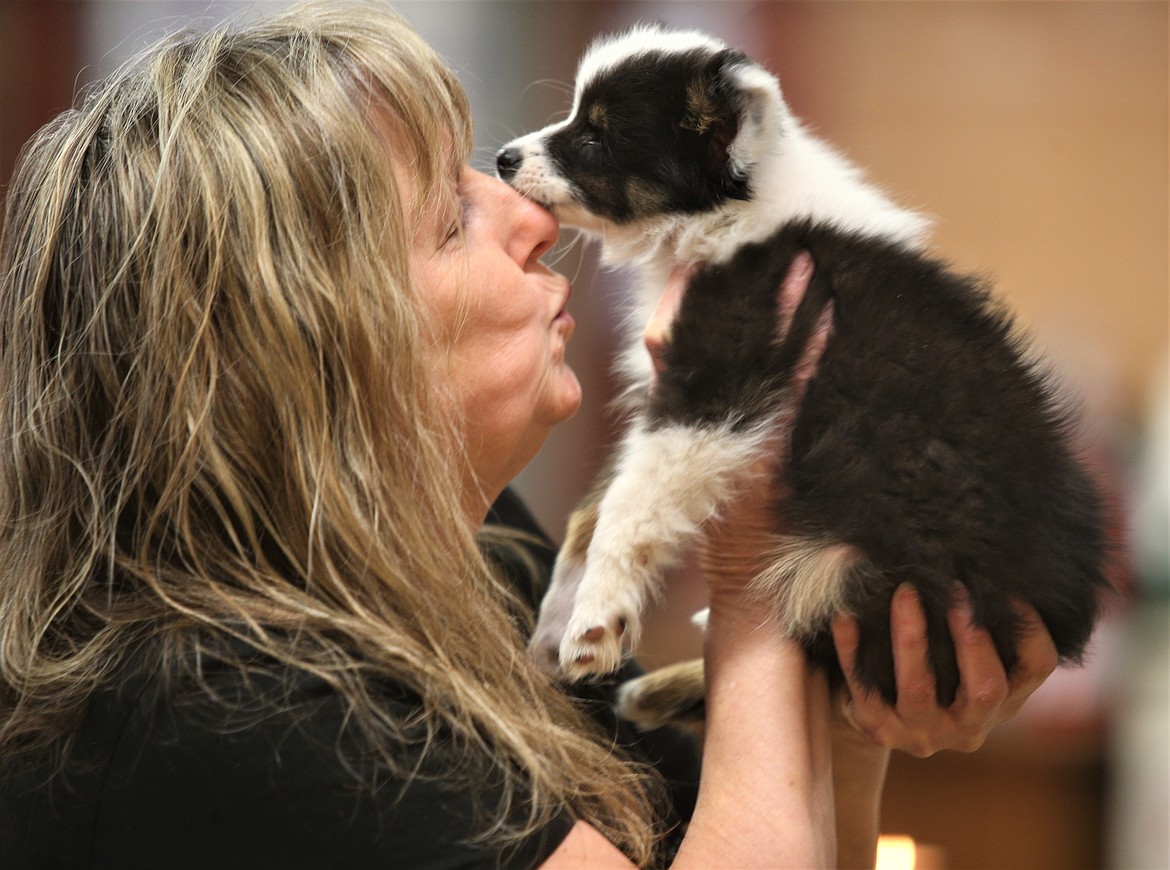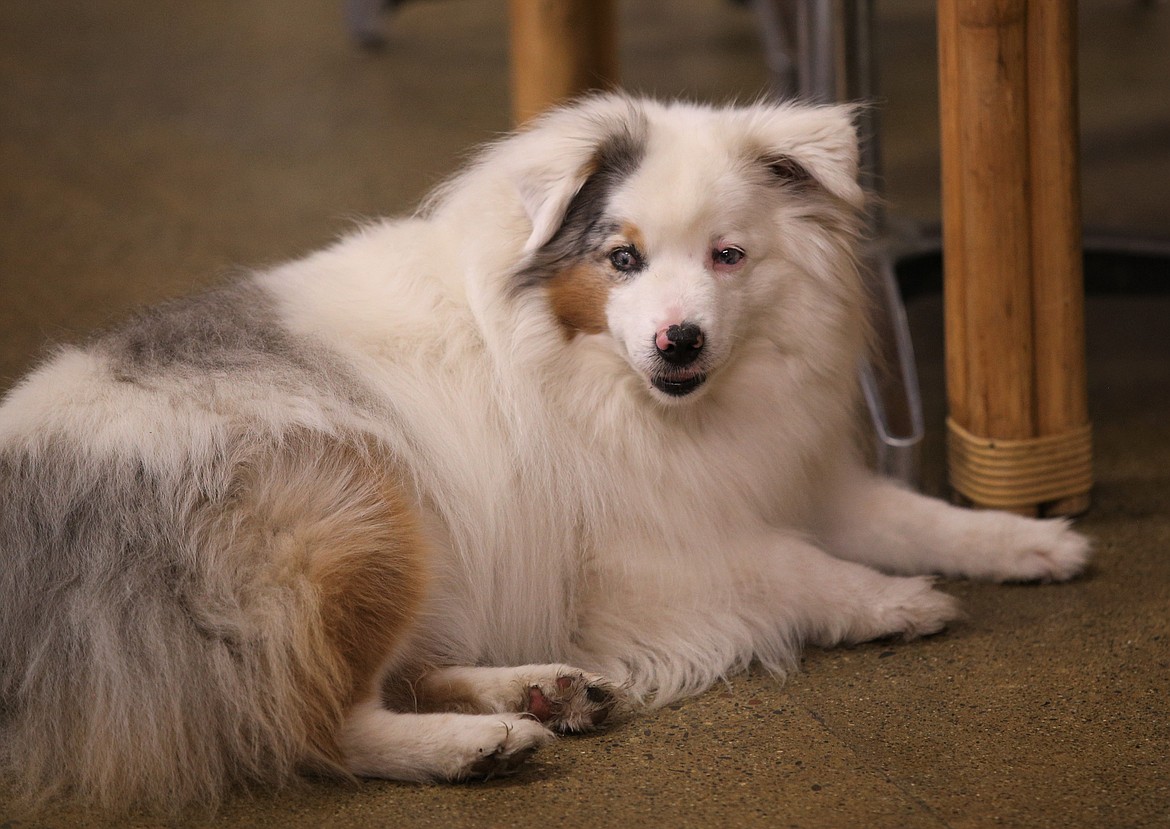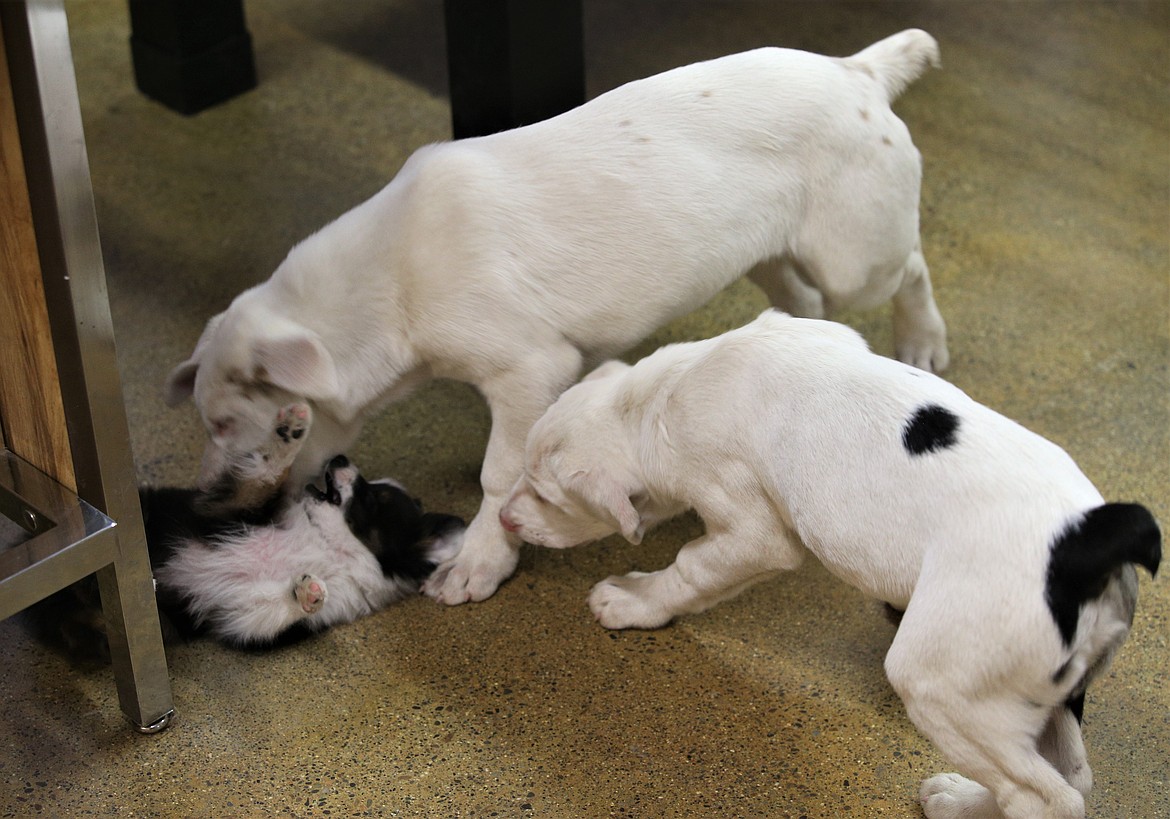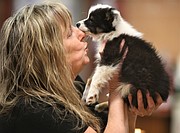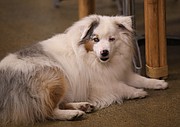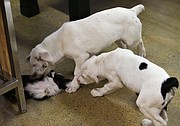Deaf, blind and loved
HAUSER LAKE — The blind. The deaf. The ones with special needs. The ones nobody wants. The ones marked for death.
Those are the ones Cristene Justus takes in.
Those are the ones that find a home at Double J Dog Ranch Inc. in Hauser Lake.
Those are the ones that find love, perhaps for the first time in their lives.
"I think if people are willing to open their homes in their hearts to these dogs, they'll find out just how special it is to have them in their family," Justus said Friday morning.
"A lot of people have the misconception, 'Oh, that's a lot of work. I don't have time for that, I couldn't do a deaf dog, I don't have time.'"
But you do, Justus says.
"You just train them a little bit differently," she said.
As she sits inside her business, Justus Trading Company on Clover Leaf Road, four dogs bound around her.
They fight for a visitor's attention.
"They love people," Justus says.
These are not your ordinary four-legged furry friends.
Two are blind puppies, with a third brother back at Double J.
Two others are brothers Liam and Wesley, deaf miniature Australian shepherds. They came to Double J 11 years ago. Justus said they were cute puppies that no one wanted.
She did.
Justus trained them to be the stars of an educational outreach program, visiting schools, starring in parades, surprising people with what deaf and blind dogs can do.
Liam and Wesley thrive in their roles, happy, energetic and intelligent.
In her arms, she holds Bumper, a toy Australian shepherd. The dog is eight weeks old, about the size of a softball, and it is blind.
Bumper and a blind and deaf Australian shepherd named Stella are being trained to replace Liam and Wesley, who are being retired due to illness.
"When we have educational outreach dogs, we need them to be approachable," Justus said. "We need them to be smart. We need to be able to train them."
Since opening the nonprofit dog sanctuary in 2009 on her 50 acres at Hauser Lake, Justus estimates she has provided a home and found homes for hundreds of dogs, most blind or visually impaired, that might otherwise have been euthanized.
If she could make people understand one thing, it would be this: Dogs with special needs "are perfect in every way that matters."
"The mistake that I see a lot of people make is they feel sorry for them, especially blind dogs," she said. "They focus too much on what these dogs can't do. The biggest thing I can tell these people is the only restrictions these dogs have are the ones that you put on them. Let them be a dog."
Give a dog a home
She recounted a story of a man who dropped off a German shepherd with straight-leg syndrome, which is basically stiff hind legs. He didn't want it because it couldn't get around well.
Turns out, it could.
Justus worked with it, turned it loose, and watched it spring into action. She later showed the former owner a video of it jumping around. He was surprised.
Justus wasn't.
"Let him be a dog. Let him figure it out," she said. "They're smart, they figure it out. And especially with deaf dogs. I always say this to people that have never had a deaf dog. 'Give it a couple of months and you won't even notice anymore.' And they call and they go, 'You're right.'"
Don't get the idea that Justus sets the dogs on her property and tosses out food and they're good.
It takes a lot of work, a lot of love, and a lot of money.
The investment is more than worth it, says Justus, who grew up in a country home in Oregon that always had dogs and farm critters running around.
"I love it because the dogs are happy," said Justus. "They're happy to live together in a big pack."
The 20 or so she generally has on any given day have a fenced 3 acres to roam that comes with a shop building they enter and leave freely. It's air-conditioned in the summer and heated in the winter.
She lets a few sleep in the house each night on a rotating basis.
They receive health care. They eat nutritious food. They are trained in basic obedience and hand signals.
The annual budget to operate Double J Dog Ranch is about $55,000. No one gets paid. Donations go to the dogs.
She credits donors and volunteers for allowing her to carry out a mission to save as many as she can.
The day after last Sunday's Hauser Lake Icebreaker run, a benefit for Double J that saw a record 731 registrations, she sat down to watch a video of the start of the race.
People kept streaming past, many running with dogs.
Justus couldn't believe they were all there for Double J.
"I just sat there in my chair with my cup of coffee, and I just bawled. Like, really proud of this, it's all for the dogs," she said. "It's pretty amazing. It's amazing the community that we have."
Early days
Double J's start can be traced to when Justus had two blind German shepherds. A friend asked if she could foster a blind and deaf Australian shepherd. She said sure.
That led her to eventually start researching why these dogs were blind and deaf and came across the term "lethal whites."
Not because being blind and deaf would kill them, but because people often put them down.
Why so many blind dogs? Justus says much of it is bad breeding practice.
Pethelpful.com explains it like this:
"In certain breeds of dog, there is a coat pattern known as 'merle.' It is sometimes referred to as a color, but is in fact due to a gene that alters the way pigment appears in the dog's coat.
"The merle coat pattern is popular because it is unusual and very unique, with each merle dog having a different coat pattern. Unfortunately, there are health problems associated with the merle mutation and the risk of these problems occurring increases when two merle-coated dogs are mated together.
"The resulting litter of puppies has a high chance of containing 'double merles' or 'lethal whites,' dogs that have very little or no color to their coat at all."
Double merles are highly likely to suffer from eye or ear deformities or both. Extreme can result in complete blindness and deafness.
"Needless to say, the deliberate breeding of double merles causes a lot of controversy in the canine world," Pethelpful reported.
A sanctuary is born
As Justus looked into it, she was alarmed at the number of animals being euthanized because they were perceived to be disabled.
She was determined to prevent it and believed with her Hauser Lake property, she had the means to do it.
"I can help these dogs," she said.
Double J started as a sanctuary for 20-25 dogs who could live out their lives there.
But when a friend pointed out to Justus she could help more dogs if she adopted them out, that's what she did and intends to continue doing.
"Our goal shifted from taking on residents to adoptable dogs," she said. "If I kept them all, I can't help any more dogs."
Her work has received national recognition.
Double J has a partnership with Animal Planet, a television channel that has visited the ranch, filmed the dogs and learned about their program.
Chicklet, a deaf puppy from Double J Dog Ranch, in 2015 starred in "Puppy Bowl XI, Ruff vs. Fluff," on Animal Planet during Super Bowl Sunday.
In 202l, the dog ranch's special needs puppies Filbert and Daphne took the field in Animal Planet's Puppy Bowl XVI.
It's all good, anything to bring attention to the plight of dogs, said Justus, who maintains she is not the face of Double J.
Her best friends are.
"It's about the dogs. And that's where the focus will always stay," she said. "Sure, it's a lot of work, and we're the ones in the trenches. But ultimately people want to know about them. And I will always keep it that way."
It's paid off.
Double J recently received $5,000 from STCU and KREM for winning its "Who Do You Love" contest for nonprofits in Eastern Washington and North Idaho.
The program lets people nominate their favorite local, nonprofit organizations.
"People care about these animals," Justus said. "They care about this organization."
People often drive by the ranch to look at the dogs, to admire these big-hearted creatures. They know of the good work being done here.
"I'm proud of that," Justus said. "I'm proud of where we've become."
Dogs for adoption
Dogs at Double J come with a variety of challenges and needs. They include:
- Meet Otis, a 3-month-old, deaf, Auggie. This is a mini Aussie/Corgi cross, but Otis looks Aussie. He will probably top out at 30 pounds give or take. Otis has never met a toy or playmate he didn't get along with and would easily slide into most any family with ease.
- Henny is a deaf, 6-month-old, cattle dog mix. She is super smart, high energy and has not met a ball or fetch toy she didn't like.
- Meet 8-year-old siblings Arthur, Olive and Bert. They were all born with no front limbs (Olive has small underdeveloped limbs) and they are Dachshund/Chihuahua mixes. Arthur is the largest and most Doxy like weighing in at 11 pounds while Olive and Bert more resemble the Chi, weighing in at 6 pounds each. We believe she will do well with kiddos and other dogs alike.
- Nelle is a 6-year-old, deaf, mini Aussie, Nellie. She is adjusting well to the ranch after her owner passed away. She has severe anxiety and finds it hard to settle.
These great dogs need homes.
"They would be great family members," Justus said.
Education, outreach
Justus tells a story of three summers ago when a woman called and said she had a litter of Great Dane puppies she didn't want.
"I said, 'What's up?' She said they were all deaf. So there were five Great Dane puppies, deaf, that we took."
She did so on one condition: The woman had to spay her dog.
She did. And Double J found homes for every deaf Great Dane.
Some have remained at Double J as permanent residents.
"I felt it was in their best interests to stay where they were at, and now they're all senior citizens," she said, smiling.
But the primary goal now is getting these lovable dogs adopted into homes, but not just any home.
There is an application process. There are background checks. It has to be the right fit.
"We want our dogs to be healthy and safe and loved, so we're kind of picky," Justus said.
She becomes attached to each, but is delighted when they are adopted.
"You see how happy they are," she said. "They get a sofa of their own. They have a family."
Sure, the dogs of Double J are different. Some can't see. Some can't hear. Some are missing limbs.
"They're born this way, and they don't know they're any different," Justus said.
But all feel love. And they love in return.


